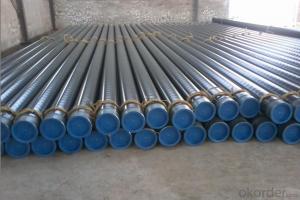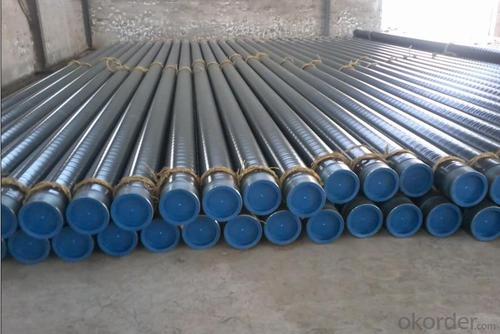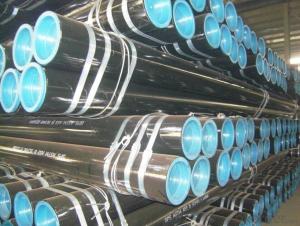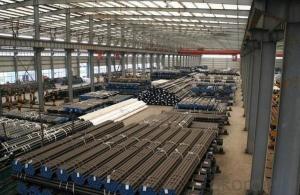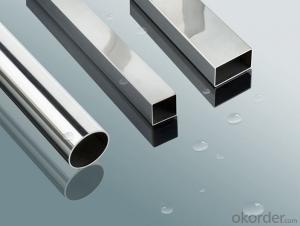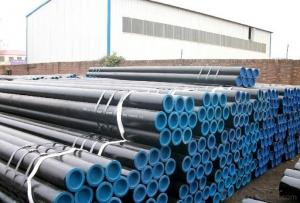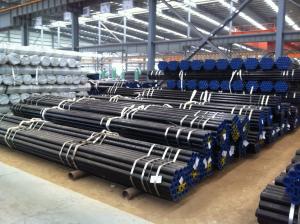Carbon Seamless steel pipe hot Rolled/Cold Rolled/ Cold Drawn
- Loading Port:
- Tianjin
- Payment Terms:
- TT or LC
- Min Order Qty:
- 25 m.t.
- Supply Capability:
- 9000 m.t./month
OKorder Service Pledge
OKorder Financial Service
You Might Also Like
1、Structure of Carbon Seamless steel pipe hot Rolled/Cold Rolled/ Cold Drawn Description:
Seamless pipe is formed by drawing a solid billet over a piercing rod to create the hollow shell. As the manufacturing process does not include any welding, seamless pipes are perceived to be stronger and more reliable. Historically seamless pipe was regarded as withstanding pressure better than other types, and was often more easily available than welded pipe.
2、Main Features of the Carbon Seamless steel pipe hot Rolled/Cold Rolled/ Cold Drawn:
• High manufacturing accuracy
• High strength
• Small inertia resistance
• Strong heat dissipation ability
• Good visual effect
• Reasonable price
3、Carbon Seamless steel pipe hot Rolled/Cold Rolled/ Cold Drawn Specification:
Standard | GB, DIN, ASTM |
Grade | 10#-45#, 16Mn |
Thickness | 8 - 33 mm |
Section Shape | Round |
Outer Diameter | 133 - 219 mm |
Place of Origin | Shandong, China (Mainland) |
Secondary Or Not | Non-secondary |
Application | Hydraulic Pipe |
Technique | Cold Drawn |
Certification | API |
Surface Treatment | factory state or painted black |
Special Pipe | API Pipe |
Alloy Or Not | Non-alloy |
Length | 5-12M |
Outer Diameter | 21.3-610mm |
Grade | 20#, 45#, Q345, API J55, API K55, API L80, API N80, API P110, A53B |
Standard | ASME, ASTM |
Material:20#(ASTM A 106/A53 GRB.API5LGRB,GB),45#,16Mn,10#.
2.Specification range:OD:21.3-610mm,WT:6-70mm,length:6-12m or according to the requirement of clients.
3.Excutive standards:GB,ASME API5L.ASTM A 106/A53,Despite of the above standards,we can also supply seamless steel pipe with standard of DIN,JIS,and so on,and also develop new products according to the requirements of our clients!
4.Surface:black lacquered,varnish coating or galvanized.
5.Ends:Beveled or square cut,plastic capped,painted.
6.Packing:bundles wrapped with strong steel strip,seaworthy packing.4.Carbon Seamless steel pipe hot Rolled/Cold Rolled/ Cold Drawn
Images:
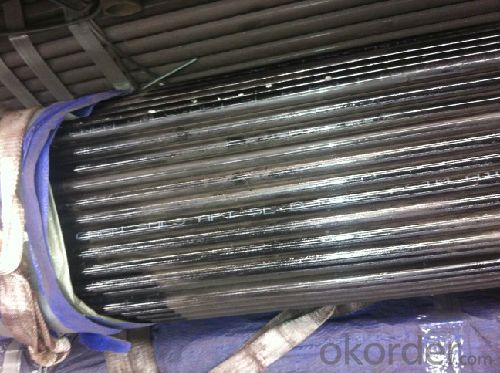
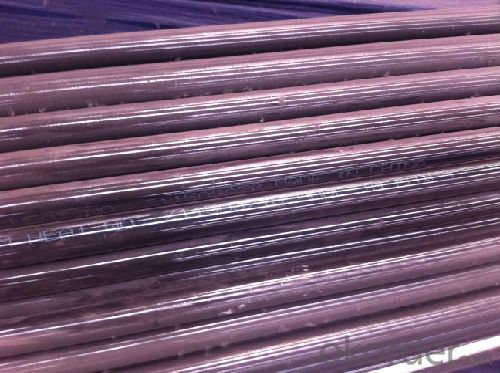
5、FAQ of Carbon Seamless steel pipe hot Rolled/Cold Rolled/ Cold Drawn:
①How is the quality of your products?
Our products are manufactured strictly according to national and internaional standard, and we take a test
on every pipe before delivered out. If you want see our quality certifications and all kinds of testing report, please just ask us for it.
Guaranteed: If products’ quality don’t accord to discription as we give or the promise before you place order, we promise 100% refund.
②How about price?
Yes, we are factory and be able to give you lowest price below market one, and we have a policy that “ for saving time and absolutely honest business attitude, we quote as lowest as possible for any customer, and discount can be given according to quantity”,if you like bargain and factory price is not low enough as you think, just don’t waste your time.Please trust the quotation we would give you, it is professional one.
③Why should you chose us?
Chose happens because of quality, then price, We can give you both.Additionally, we can also offer professional products inquiry, products knowledge train(for agents), smooth goods delivery, exellent customer solution proposals.Our service formula: good quality+good price+good service=customer’s trust
SGS test is available, customer inspection before shipping is welcome, third party inspection is no problem.
- Q: Can steel pipes be used for chemical refineries?
- Chemical refineries can utilize steel pipes for their operations. Steel pipes are frequently employed in chemical refineries because of their exceptional strength, long-lasting nature, and resistance to corrosion. Given the harsh conditions present in a chemical refinery, including exposure to corrosive chemicals and extreme temperatures, it is necessary to employ materials that can endure such circumstances. Steel pipes possess the capability to withstand these challenges and are often preferred for their ability to securely and efficiently transport diverse fluids and gases. Furthermore, the weldability of steel pipes permits easy installation and maintenance within intricate refinery systems. All in all, steel pipes are a fitting choice for chemical refineries due to their durability, ability to resist corrosion, and compatibility with the demanding conditions encountered in this industry.
- Q: Can steel pipes be used for underground water lines?
- Yes, steel pipes can be used for underground water lines.
- Q: How long do steel pipes typically last?
- Steel pipes typically last for several decades, with an average lifespan ranging from 50 to 100 years depending on various factors such as usage, maintenance, and environmental conditions.
- Q: What materials are used in scaffolding pipes?
- Fastener warranty information should be complete, enter the site should be carried out after re sampling technology, performance shall be in accordance with provisions of the "GB15831" steel pipe scaffold fastener, before use should be individually selected, cracks, deformation, bolt slide wire is strictly prohibited.
- Q: What is the role of steel pipes in the transportation of water?
- The role of steel pipes in the transportation of water is to provide a durable and reliable infrastructure for the safe and efficient conveyance of water from its source to various destinations. Steel pipes are known for their strength, corrosion resistance, and ability to withstand high pressure, making them ideal for water transportation systems. These pipes ensure that water is delivered to homes, businesses, and other locations, while maintaining its quality and preventing leaks or contamination.
- Q: What are the environmental impacts of using steel pipes?
- The environmental impacts of using steel pipes include the extraction and processing of raw materials, such as iron ore and coal, which contribute to deforestation, habitat destruction, and greenhouse gas emissions. The manufacturing process also generates significant amounts of waste, including slag and emissions from steel production. The transportation and installation of steel pipes contribute to carbon emissions, while their corrosion and maintenance may result in the release of toxic substances into the environment. Proper waste management and implementing sustainable practices can help mitigate some of these impacts.
- Q: What are the factors to consider when selecting the right steel pipe for a specific application?
- When selecting the right steel pipe for a specific application, there are several factors that need to be considered. These factors include: 1. Material compatibility: It is important to ensure that the steel pipe is compatible with the material it will be transporting or containing. Different materials may require specific types of steel pipes to avoid corrosion or contamination. 2. Pressure and temperature requirements: The pressure and temperature conditions that the steel pipe will be exposed to must be taken into account. This will determine the required thickness and strength of the pipe to ensure it can withstand the desired operating conditions. 3. Size and dimensions: The size and dimensions of the steel pipe should be chosen based on the flow rate, volume, and space available for installation. It is crucial to select a pipe with the appropriate diameter and wall thickness to prevent any flow restrictions or leakage. 4. Environmental conditions: The environment in which the steel pipe will be installed should be considered. Factors such as exposure to moisture, chemicals, or extreme temperatures may require the use of specific coatings or materials to enhance the pipe's durability and longevity. 5. Cost considerations: The cost of the steel pipe and its installation should be taken into account. It is essential to strike a balance between the desired quality and the available budget to ensure the most cost-effective solution. 6. Regulatory compliance: Depending on the application, there may be specific industry regulations or standards that need to be followed. It is important to choose a steel pipe that meets these requirements to ensure compliance and avoid any legal or safety issues. 7. Maintenance and lifespan: The maintenance requirements and expected lifespan of the steel pipe should also be considered. Some applications may require regular inspections or replacements, while others may require a more durable and long-lasting pipe. By carefully considering these factors, one can select the right steel pipe for a specific application that meets the desired performance, durability, and safety requirements.
- Q: What are the advantages of using stainless steel pipes?
- There are several advantages of using stainless steel pipes. Firstly, stainless steel pipes have excellent corrosion resistance, making them suitable for various industries, including water supply, chemical processing, and oil and gas. Secondly, they have high strength and durability, allowing them to withstand extreme temperatures and pressure. Additionally, stainless steel pipes are hygienic and easy to clean, making them ideal for applications in the food and beverage industry. Lastly, they have a long lifespan and require minimal maintenance, resulting in cost savings in the long run.
- Q: What is the lifespan of galvanized steel pipes?
- The lifespan of galvanized steel pipes can vary depending on various factors such as the environment, usage, and maintenance. However, on average, galvanized steel pipes can last between 40 to 70 years.
- Q: Can steel pipes be used for underground chemical injection?
- Yes, steel pipes can be used for underground chemical injection. Steel pipes are known for their durability and corrosion resistance, making them suitable for various applications, including underground chemical injection. However, it is also important to consider the type of chemical being injected and verify if steel pipes are compatible with the specific chemical to avoid any potential reactions or degradation.
Send your message to us
Carbon Seamless steel pipe hot Rolled/Cold Rolled/ Cold Drawn
- Loading Port:
- Tianjin
- Payment Terms:
- TT or LC
- Min Order Qty:
- 25 m.t.
- Supply Capability:
- 9000 m.t./month
OKorder Service Pledge
OKorder Financial Service
Similar products
Hot products
Hot Searches
Related keywords
